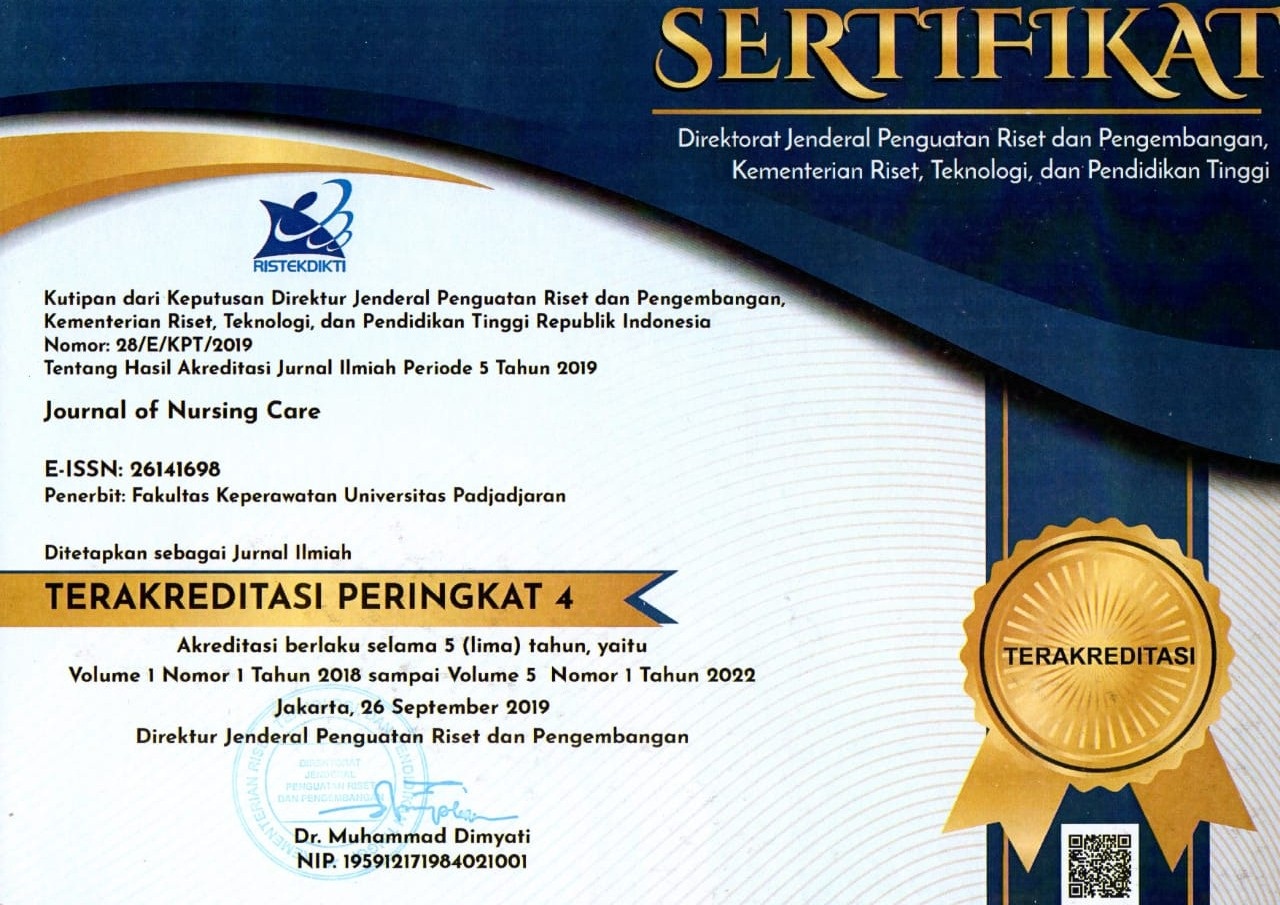The Relationship between The Quality of Sleep and Learning Concentration among School-Age Children
Abstract
Parallel to the operational concrete development stage, school-age children start to develop their skills in logical thinking and problem-solving. They need adequate concentration to grow at the stage successfully. One of the determining factors in achieving such concentration is the quality of sleep. The study aims to analyze the relationship between sleep quality and learning concentration among school-age children. This research is a cross-sectional descriptive quantitative study. The samples were taken by proportional stratified random sampling from 53 respondents of 111 populations. Data were collected using PSQI and concentration questionnaires and analyzed using chi-square. The results indicated that 47 children (88.7 %) had a low sleep quality and 33 children (62.3 %) on a middle range of learning concentration. The statistical analysis showed 58.5 % of children with low sleep quality had a middle learning concentration level and 30.2 % had a low concentration level with a p-value (0.000) < value α (0.05). It can be concluded that there is a significant relationship between the quality of sleep and the level of learning concentration for school-age children at SD IT Al-Maqom Cimahi. Nurses as healthcare professionals can cooperate with the school to provide health education for the students and their parents regarding decent sleep quality and its effect on their growth and development, especially in studying. The parents can modify their children’s daily activities, especially before bedtime. One of them is rules about using gadgets and other electronic media in their bedrooms.
Keywords
Full Text:
PDFReferences
Alfiyah, S. N., Susilaningsih, F. S., & Yudianto, K. (2018). Adolescent Moslem Students Sleep Hygiene Behaviour Description At Pondok Pesantren. Journal of Nursing Care, 1(1), 16. https://doi.org/10.24198/jnc.v1i1.15760
Andrian, R. J. (2018). Association Between Gadget Usage and Insomnia in Medical and Nursing Students of Pelita Harapan University [Universitas Pelita Harapan]. http://repository.uph.edu/7675/
Asmadi. (2010). Teknik prosedural keperawatan konsep dan aplikasi kebutuhan dasar kliene. Salemba Medika.
Berman, A. T., Snyder, C., Geralyn, F., & Snyder, S. (2016). Kozier & Erb’s Fundamentlas of Nursing. Pearson Education. Carole, B., Msn, S., & Gnp, A. N. P. (2012). The Pittsburgh Sleep Quality Index ( PSQI ) The Pittsburgh Sleep Quality Index ( PSQI ). 29(6), 1–2.
Dewi, R. R. (2016). Pengaruh Konsentrasi Belajar Dan Berbagai Gaya Belajar Terhadap Hasil Belajar Siswa Kelas Viii Pada Pelajaran Ipa Di Smp Negeri 1 Yogyakarta Tahun Ajaran 2015/2016 (Issue 18) [Universitas Sanata Dharma]. https://repository.usd. ac.id/6329/
Fakier, N., & Wild, L. G. (2011). Associations among sleep problems, learning difficulties and substance use in adolescence. Journal of Adolescence, 34(4), 717–726. https://doi. org/10.1016/j.adolescence.2010.09.010
Hanifah, A., Widianti, E., & Yudianto, K. (2018). Learning Concentration Level of Students at Faculty of Nursing Universitas Padjadjaran (An Overview of The Z Generation). Journal of Nursing Care, 1(3). https://doi.org/10.24198/jnc.v1i3.18456
Hidayat, A. A. (2012). Pengantar Kebutuhan Dasar Manusia. Salemba Medika.
Kopasz, M., Loessl, B., Hornyak, M., Riemann, D., Nissen, C., Piosczyk, H., & Voderholzer, U. (2010). Sleep and memory in healthy children and adolescents - A critical review. Sleep Medicine Reviews, 14(3), 167–177. https://doi.org/10.1016/j. smrv.2009.10.006
Prasetya, F. I. (2019). H HUBUNGAN POLA TIDUR DENGAN KONSENTRASI BELAJAR SISWA DI KELAS Xd MA AL
– QODIRI 1 JEMBER. Medical Jurnal of Al Qodiri, 1(2), 1–10. https://doi.org/10.52264/ jurnal_stikesalqodiri.v1i2.2
Pujiana, D., & Lestari, M. (2017). Hubungan antara Kualitas Tidur dengan Konsentrasi belajar Mahasiswa Program Studi Ilmu Keperawatan (PSIK) Semester VI Stikes Muhammadiyah Palembang. Masker Medika, 5(1), 315–325. https://doi.org/https://doi. org/10.52523/maskermedika.v5i1
Retnaningsih, D., & Kustriyani, M. (2018). Hubungan Antara Kualitas Tidur dengan Konsentrasi Belajar pada Anak Usia Sekolah di SD Negeri 3 Candisari Kecamatan Purwodadi Kabupaten Grobogan. Jurnal Ners Widya Husada Semarang, 1(1), 43–50. https://doi.org/DOI: https://doi.org/10.33666/ jners.v1i1.124
Safitrie, A., & Ardani, M. H. (2013). Studi Komparatif Kualitas Tidur Perawat Shift dan Non Shift di Unit Rawat Inap dan Unit Rawat Jalan. Prosiding Konferensi Nasional PPNI Jawa Tengah, 17–23. https://jurnal.unimus. ac.id/index. php/psn12012010/article/ view/843/897
Saputra, L. (2013). Pengantar Kebutuhan Dasar Manusia. Binarupa Aksara.
Setyani, M. R., & Ismah, I. (2018). Analisis Tingkat Konsentrasi Belajar Siswa Dalam Proses Pembelajaran Matematika Ditinjau Dari Hasil Belajar. Seminar Nasional Pendidikan Matematika UHAMKA, 01, 73– 84. https://journal.uhamka.ac.id/index.php/ senamku/article/view/2653/777
Slameto. (2015). Belajar dan Faktor-faktor yang Mempengaruhinya. Rineka Cipta.
Susanti, Y. I. D. (2018). Hubungan Antara Pola Tidur dengan Prestasi Belajar. School Education Journal PGSD UNIMED, 8. https://doi.org/https://doi.org/10.24114/ sejpgsd.v8i1.10908
Syah, M. (2011). Psikologi Pendidikan dengan Pendekatan Baru. Remaja Rosdakarya. Tanjung, M. C., & Sekartini, R. (2016). Masalah Tidur pada Anak. Sari Pediatri,
(3), 138. https://doi.org/10.14238/ sp6.3.2004.138-42
Yusuf, S. (2014). Psikologi Perkembangan Anak dan Remaja. Rosdakarya Offset.
Zulfa, N. A., & Mujazi, M. (2021). Hubungan Pola Tidur Terhadap Konsentrasi Belajar Peserta Didik di SDN Kembangan Utara 06 Pagi. Prosiding Seminar Nasional Ilmu Pendidikan Dan Multi Disiplin (Vol 4). https://prosiding.esaunggul.ac.id/index.php/ snip/article/viewFile/198/197
DOI: https://doi.org/10.24198/jnc.v5i3.33360
Refbacks
- There are currently no refbacks.

This work is licensed under a Creative Commons Attribution-ShareAlike 4.0 International License.










Redaksi Journal of Nursing Care:
Fakultas Keperawatan, Universitas Padjadjaran
Jalan Raya Bandung-Sumedang Km. 21 Jatinangor, Sumedang, Indonesia 45363
WA: 085314295890
Tlp. 022-7795596
Email: jnc.fkep@unpad.ac.id

This work is licensed under a Creative Commons Attribution-NonCommercial 4.0 International License


